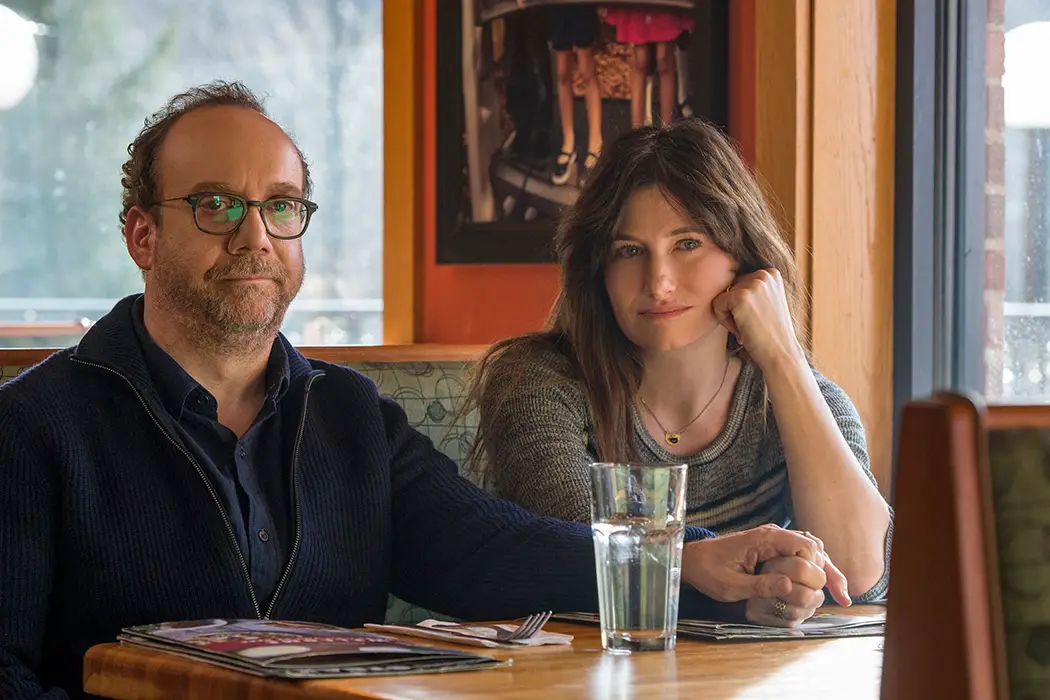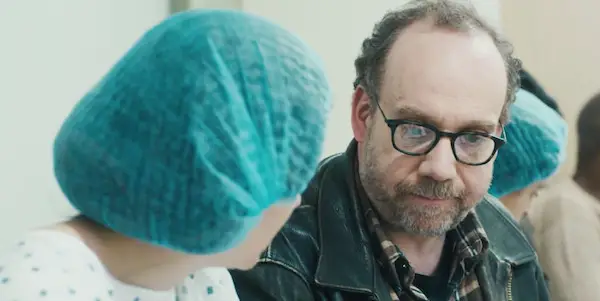PRIVATE LIFE: A Bittersweet Portrait Of A Couple’s Pursuit Of Parenthood

Christina Tucker is a NY-based production assistant and wannabe screenwriter.
Written and directed by Tamara Jenkins, Private Life depicts a couple in their 40s coping with infertility who have chosen to explore the world of adoption and medically assisted reproduction. We are shown every element of their pursuit of a child: embryo storage, egg retrieval, hormone injections, medication, IVF, IUI, TESE, adoption scams, social workers, and more. It is a process full of stress, frustration, and desperation for Rachel (Kathryn Hahn) and her husband Richard (Paul Giamatti).
The performances of the two leads are fantastic, grappling with the tonal line this film walks expertly, with enthralling emotional sensitivity. The portions of mostly deadpan comedy come from the lunacy of all these processes and the social stigma that follows, from the way they’re packaged and described by medical professionals, and from Rachel and Richard’s manic energy while pursuing them. Still, this is not truly a comedy, but rather a bittersweet drama in which two people largely use dark humor to lighten what is, for them, a medical issue that has consumed their relationship.
The modern medical processes depicted in Private Life are a reality for many couples, and the story is told in an empathetic and intimate way, that takes into account the financial, social, and medical difficulties that accompany having children later in life. Private Life also skillfully draws humor from, while thoughtfully exploring, the amount of pressure put on women to “have it all” in the name of empowerment despite the biological realities of aging. It is also a beautifully crafted study of two people who struggle to relinquish their desire to control and plan every element of their life, to compromise and accept uncontrollable aspects of life in order to find happiness.
“Fantasy of fertility”
Rachel is an author and playwright with a soon-to-be-released book, and Richard is a theatre director who manages a pickle company. Jenkins has chosen the class and careers of her protagonists carefully, it seems, for they seem almost stereotypically, almost comically metropolitan. “Rent-stabilized apartment on Avenue A” or not, these are upper-middle class, well-read, socially conscious people who had the access and opportunity to pursue artistic careers. They riff about Karl Ove Knausgård and Lisa Yuskavage and Jerzy Grotowski. Their “rent-stabilized” apartment is beautifully, quirkily furnished. Again, this feels intentional, highlights that despite their success and the desirability of their lives, there is an element of adulthood, child rearing, that is still seen as a prerequisite of successfully completing adulthood.

This is not to say that Richard and Rachel are sitting on infinite funds. IVF is expensive, and Richard and Rachel need a loan of $10,000 from Richard’s brother Charlie (John Caroll Lynch), who has lent them money in the past for their various procedures. Charlie’s wife Cynthia (Molly Shannon) is none too happy. Cynthia, although she has the air of suburban, upper-class judgment, makes a fair point that Richard and Rachel’s long-running, obsessive pursuit of fertility is neither joyful nor beneficial to their relationship, but is rather consuming them, causing stress, instability, and conflict. When we see intimacy from Rachel and Richard – who laments to Rachel that they have not had sex in 11 months – it’s when they have stopped stressing about having exactly what they want and are rather enjoying one another’s company, without expectation.
When Rachel and Richard let go of their need to control their fertility process, and force themselves to allow for a change in plan, Sadie (Kayli Carter, as a perfect empathetic, impulsive, judgmental millennial), Cynthia’s daughter, Richard’s stepdaughter, and an aspiring writer, all but falls into their lap, more than willing to be Richard and Rachel’s egg donor. Sadie becomes a daughter figure to the couple, and their reconnection with a family member brings joy, energy and variety into their relationship. Still, there are unforeseen consequences to Sadie’s egg donation, one of which is Cynthia’s concern for her daughter. Cynthia is more of a traditionalist when it comes to fertility, but is, thankfully, not a villain, but a complex woman dealing with her own personal issues and traversing the expectations placed on women in her own way.
“All it takes is one good egg.”
At the center of many of the conflicts, humor, and emotional beats in this film is the fact that the stress that comes from pursuing fertility is unnecessarily fraught for women. Rachel goes through painful procedure after painful procedure, having to explain and defend her choices in repeated uncomfortable social interactions. Sadie, too, is chastised by her doctor for not producing eggs at the “right rate” as she begins the process of IVF. Rachel’s emotional scenes are truly heartbreaking due to this layering of difficulties and expectations – her insecurities about her infertility, about egg donation, about her age, about being left out of her child’s conception (the process of utilizing an egg donor forgoes Rachel’s genetic link to the child, but not Richard’s) – all of these are beautifully acted, and Hahn deftly portrays a woman who is sad, angry and exhausted as well, and feels that she has been sold a false bill of goods as a younger woman.

Jenkins has confronted, with nuance and complexity, the disappointing truth that women can’t, in fact, have it all. Sadie says that her mother herself has told her time and time again that women have to sacrifice things when they have kids, and she’s right. Rachel criticizes “the lie that I could have a career and then kids” that she was fed in college as feminist ideology, and ultimately feels that she is being blamed and punished for their difficulty conceiving, because of life choices she was told were progressive, empowering, and morally sound. (Richard, hilariously responds that Rachel can’t blame Gloria Steinem for their ambivalence about having a kid in their younger years.)
Forgoing having children younger to focus on one’s career will likely make it harder to have children later, and having children younger often makes it more difficult to salvage prime career-building years. It’s not the same for men, and this unfairness, one of biology rather than a specific perpetrator on whom to lay blame, creates a directionless resentment that can only fester, leaving Rachel and Richard exhausted. Biology, in fact, is the only real antagonist present in this film, and anger toward biology, and in many ways the realities of life that are unchangeable, unexplainable, and without reason, are confronted by Richard and Rachel as they struggle to find a sense of completeness as individuals and as a couple.
Private Life: Conclusion
Ultimately, family – the way it is created, the way it turns out, the way family members relate to and conflict with one another – cannot be perfect and cannot be completely controlled. Surprises and disappointments arise for Rachel and Richard, and they must confront themselves and their choices in a way that is heartbreaking, inspiring, and beautifully acted.
Private Life has a bittersweet conclusion, a frustrating one that creates doubt that things will improve for its protagonists. Still, there is a growth in Rachel and Richard’s bond, and a strengthened relationship found in their niece Sadie, which is enough to make the conclusion feel like a victory, which is a testament to the thematic strength of the film, of emotionally successful performances, as well as the writing and direction of Tamara Jenkins.
Did Private Life convey a very emotional, complicated medical situation in a way that seemed both empathetic and realistic? Let us know!
Private Life was released on Netflix in the US on October 5, 2018.
Does content like this matter to you?
Become a Member and support film journalism. Unlock access to all of Film Inquiry`s great articles. Join a community of like-minded readers who are passionate about cinema - get access to our private members Network, give back to independent filmmakers, and more.













